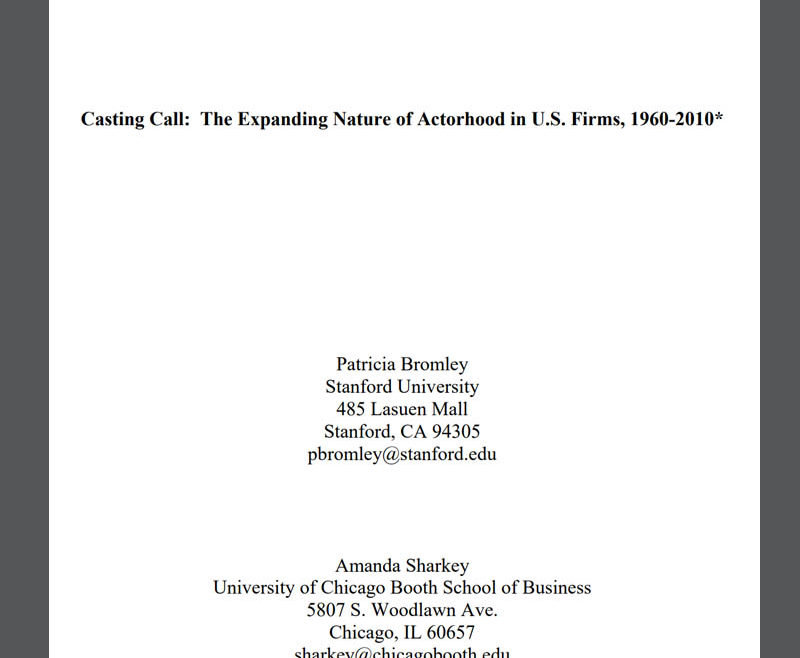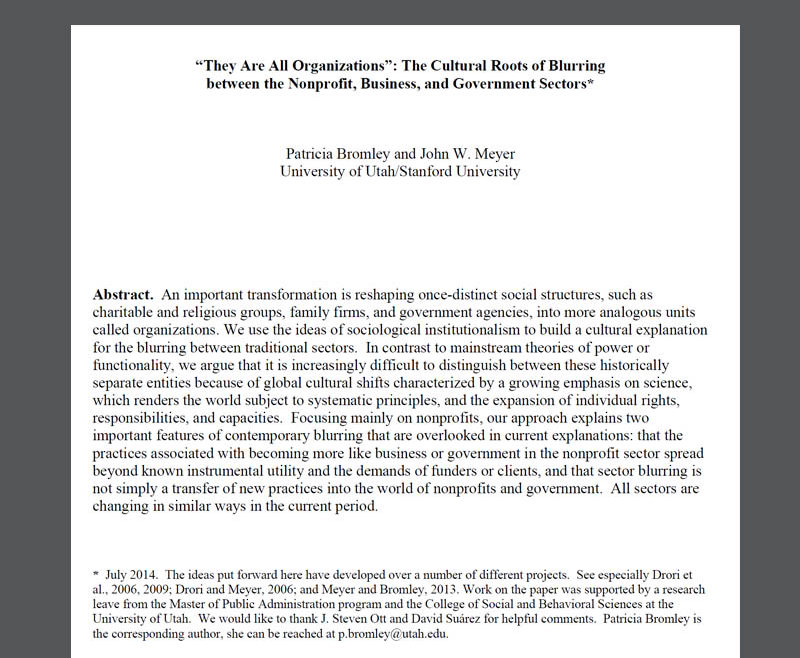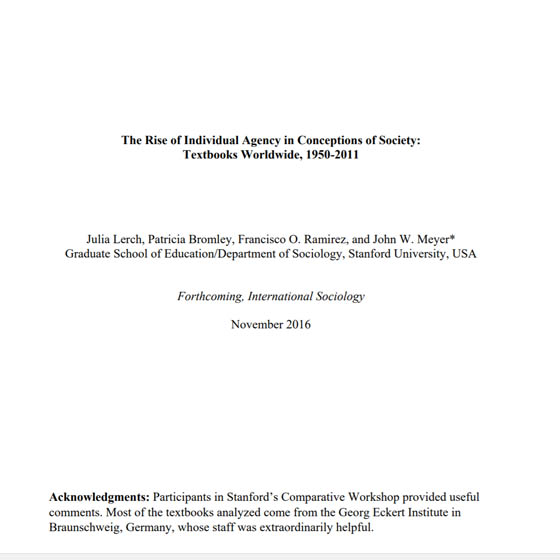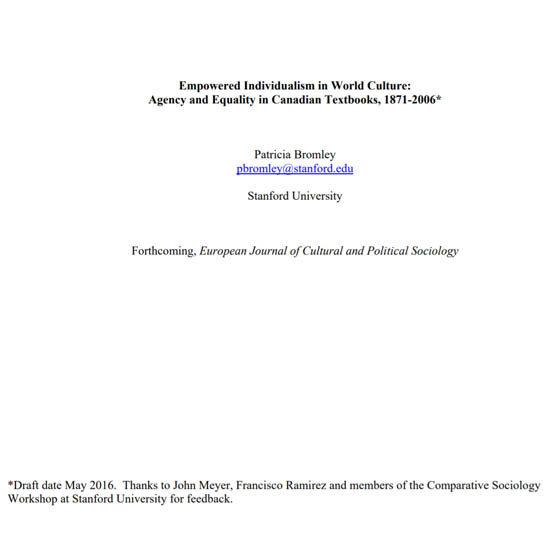Actorhood & Individual Empowerment
Actorhood & Individual Empowerment
Hyper-Management: Neoliberal Expansions of Purpose and Leadership
http://www.patriciabromley.com/wp-content/themes/osmosis/images/empty/thumbnail.jpg 150 150 TrishAdmin TrishAdmin http://2.gravatar.com/avatar/e215c03fe78483cee137e5421dec4d4f?s=96&d=mm&r=gEntrepreneurship as a Cultural Theme in Neoliberal Society
http://www.patriciabromley.com/wp-content/themes/osmosis/images/empty/thumbnail.jpg 150 150 TrishAdmin TrishAdmin http://2.gravatar.com/avatar/e215c03fe78483cee137e5421dec4d4f?s=96&d=mm&r=gNeoliberal governance, evaluations, and the rise of win–win ideology in corporate responsibility discourse, 1960–2010
http://www.patriciabromley.com/wp-content/themes/osmosis/images/empty/thumbnail.jpg 150 150 TrishAdmin TrishAdmin http://2.gravatar.com/avatar/e215c03fe78483cee137e5421dec4d4f?s=96&d=mm&r=gManagement Ideas and the Social Construction of Organizations
http://www.patriciabromley.com/wp-content/themes/osmosis/images/empty/thumbnail.jpg 150 150 TrishAdmin TrishAdmin http://2.gravatar.com/avatar/e215c03fe78483cee137e5421dec4d4f?s=96&d=mm&r=gThe Pyramid of Nonprofit Responsibilities: The Institutionalization of Organizational Responsibility Across Sectors
http://www.patriciabromley.com/wp-content/themes/osmosis/images/empty/thumbnail.jpg 150 150 TrishAdmin TrishAdmin http://2.gravatar.com/avatar/e215c03fe78483cee137e5421dec4d4f?s=96&d=mm&r=gCasting Call: The Expanding Nature of Actorhood in U.S. Firms, 1960-2010
http://www.patriciabromley.com/wp-content/uploads/2017/11/CastingCall.jpg 800 800 TrishAdmin TrishAdmin http://2.gravatar.com/avatar/e215c03fe78483cee137e5421dec4d4f?s=96&d=mm&r=gIt is an unexpected twist of history that today we routinely discuss firms in the United States as coherent actors with an autonomous “self.” Although court decisions dating back to the 19th century granted corporations some of the same legal rights and protections afforded to individuals, firms were not envisioned as independent actors in the sense that the term is used today. Instead, firms were contexts for action or instruments for achieving owners’ goals and interests, which have been variously described along a spectrum ranging from benevolent to dangerously selfish.
They Are All Organizations’: The Cultural Roots of Blurring between the Nonprofit, Business, and Government Sectors.
http://www.patriciabromley.com/wp-content/uploads/2017/11/blurring.jpg 800 800 TrishAdmin TrishAdmin http://2.gravatar.com/avatar/e215c03fe78483cee137e5421dec4d4f?s=96&d=mm&r=gAbstract. An important transformation is reshaping once-distinct social structures, such as charitable and religious groups, family firms, and government agencies, into more analogous units called organizations. We use the ideas of sociological institutionalism to build a cultural explanation for the blurring between traditional sectors. In contrast to mainstream theories of power or functionality, we argue that it is increasingly difficult to distinguish between these historically separate entities because of global cultural shifts characterized by a growing emphasis on science, which renders the world subject to systematic principles, and the expansion of individual rights, responsibilities, and capacities. Focusing mainly on nonprofits, our approach explains two important features of contemporary blurring that are overlooked in current explanations: that the practices associated with becoming more like business or government in the nonprofit sector spread beyond known instrumental utility and the demands of funders or clients, and that sector blurring is not simply a transfer of new practices into the world of nonprofits and government. All sectors are changing in similar ways in the current period.
The Rise of Individual Agency in Conceptions of Society: Textbooks Worldwide, 1950-2011.
http://www.patriciabromley.com/wp-content/uploads/2017/11/TheRiseOf.jpg 560 560 TrishAdmin TrishAdmin http://2.gravatar.com/avatar/e215c03fe78483cee137e5421dec4d4f?s=96&d=mm&r=gAbstract
A broadly recognized sociological insight is that rising levels of individualism increasingly characterize a growing number of countries. We examine the extent to which schooling is altered by, and transmits, this core cultural shift. We analyze 476 secondary school social science textbooks from 78 countries from 1950 to 2011 to see whether they increasingly portray society as made up of agentic individual actors of all sorts (e.g., children, women, minorities). We find emphases on older social institutions remain stable, but there are striking worldwide increases in emphases on people, especially ones empowered with rights. This global peopling of social science instruction, especially strong in the recent neoliberal decades, characterizes every type of country and textbook we can distinguish, and occurs over and above other features of books and countries.
Empowered Individualism in World Culture: Agency and Equality in Canadian Textbooks, 1871-2006.
http://www.patriciabromley.com/wp-content/uploads/2017/11/EmpoweredIndividualism.jpg 560 560 TrishAdmin TrishAdmin http://2.gravatar.com/avatar/e215c03fe78483cee137e5421dec4d4f?s=96&d=mm&r=gAbstract: The sacred status of individuals is a central pillar of world culture in research on education and beyond. The intended socialization of students is increasingly to become empowered individuals that respect human equality and diversity in a globally-interconnected world. At the same time, we have little understanding of what exactly the concept of individual empowerment means or how to capture it empirically. This study builds on prior observations about the growing status of individuals by delineating the rise of two separate but related dimensions of empowerment – agency and equality – and outlining the rise of these dimensions in the Canadian educational context. To this end, it draws on a unique dataset consisting of a systematically designed coding of eighty history, civics, and social studies textbooks used in Canada from 1871 to 2006. Refining the concept of individual empowerment reveals that its manifestations are shaped by the local context, in addition to the influences that come from world culture. Overall, increasingly empowered individuals and the structures they create (often organizations and associations of various types) become key actors in national and international society. Looking to the future, if taken to an extreme, expansions in individual empowerment may lead to instances of “hyper-empowerment”, where depictions and enactments of individual choice, control, and equality far outpace reasonable expectations.
- 1
- 2




